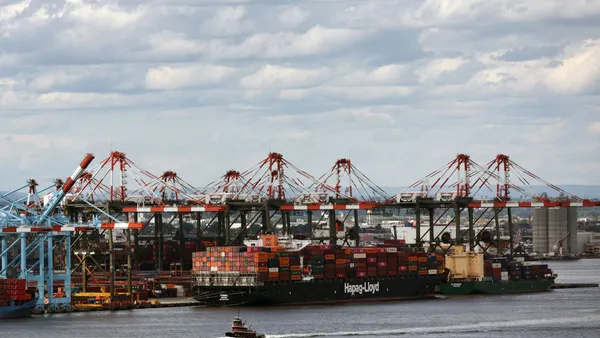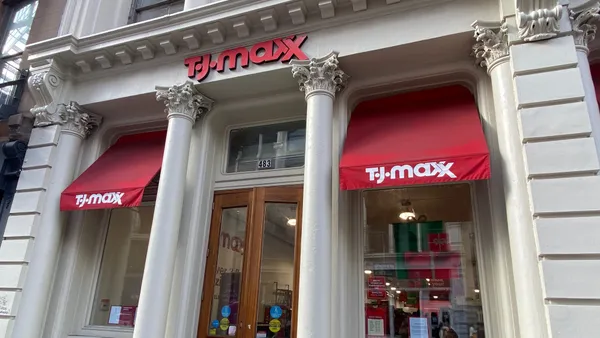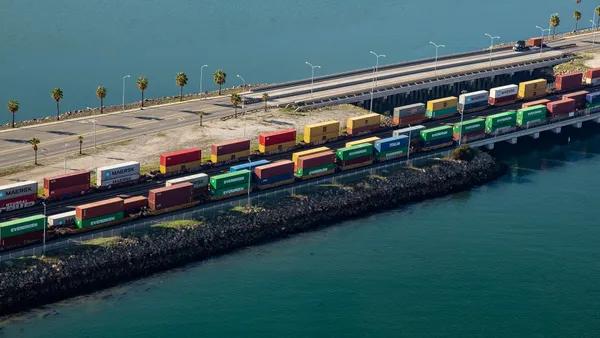UPDATE: August 30, 2019: The U.K. Department for Transport announced this morning it will be making a total of 30 million British pounds ($36.6 million) available for port infrastructure and road and rail link improvements after the Oct. 31, 2019 Brexit deadline, according to a release. U.K. Transport Secretary Greg Shapps said the funding, "supports our ports in their work to boost capacity and efficiency, ensuring they’re ready for Brexit." The updated figure is part of the government's overall 2.1 billion British pound ($2.6 billion) investment in preparations for leaving the EU.
Dive Brief:
- The U.K. Department for Transport is planning to announce a "Port Infrastructure Resilience Call" this week, according to a Bloomberg report, making 10 million British pounds ($12.19 million) available to U.K. ports to invest in inspection facilities, secure areas for loading vehicles and new gates to facilitate the additional checks needed if Britain leaves the European Union without a deal this fall.
- The grants will be capped at 1 million British pounds ($1.22 million) per port which some, including the British Ports Association, say is not nearly enough, given current infrastructural needs and anticipated slowdowns due to new cargo checks, to defray the impact to U.K. ports if the country crashes out of the EU without a deal. The Ports of Portsmouth and Dover, key entry points for fresh produce and other imports, have raised concerns about severe traffic bringing their harbors to a standstill, saying they don't have enough roads to manage increased truck dwell times.
- In addition to the potential grant opportunity, the U.K. government announced earlier this month it is looking to open up to 10 free ports across the country after Brexit to streamline international trade. The move would allow existing seaports and airports to apply for "free port status" thereby establishing themselves as a free trade zone where goods such as raw materials could be imported, manufactured and exported without being subject to certain trade regulations, namely tariffs.
Dive Insight:
"British ports have been working closely with the UK Government for the last three years on a range of Brexit scenarios," Richard Ballantyne, chief executive of the British Ports Association, said in a press release. "The industry is as ready as it can be for a ‘no deal’ although it is clear that this [port investment] is about mitigating disruption at certain ports, not avoiding it."
Like their American counterparts, ports across the U.K. have seen firms pull forward inventory in preparation for trade disruptions as the risk of shortages in product categories from raw materials to pharmaceuticals is a looming possibility.
Last month, in a statement before the U.K. Parliament’s Exiting the European Union Committee, U.K. Food and Drink Federation COO Tim Rycroft said shortages of critical foodstuffs, namely wheat and milk powder, could begin taking effect within as little as two weeks of a no-deal Brexit going into effect.
According to a report from the British Ports Association, "Statistics for the fourth quarter of port freight tonnage showed an exceptionally high growth of 6% to 121.8m tonnes [in 2018], which is consistent with suggestions that UK manufacturers were ‘stockpiling’ inventory ahead of expected trade disruptions in quarter one and two of 2019."
Overall port traffic remained roughly the same between 2018 and 2019, though unit load traffic declined, according to a British Ports Association report. The EU remains the U.K.'s number one maritime trading partner, accounting for 44% of total major port traffic in 2018.
Despite current global trade fluctuations, the U.S. remains Britain's largest trading partner overall. President Trump has been in talks with British Prime Minister Boris Johnson about negotiating a new trade deal between the two countries in preparation for a potential Brexit. The discussions have raised concerns, namely from U.K. firms and consumers, about the impact an influx of American agricultural and food products would have on the country, as some U.S. food categories including poultry, beef and genetically modified crops do not meet current U.K. or EU health standards. An additional source of contention, according to the Washington Post, is that Johnson has floated placing a 2% revenue-tax on American search engines, social media platforms and online marketplaces operating in the U.K.














